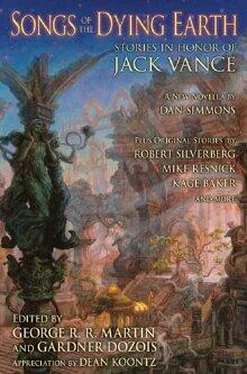Robert Silverberg - The True Vintage of Erzuine Thale
Здесь есть возможность читать онлайн «Robert Silverberg - The True Vintage of Erzuine Thale» весь текст электронной книги совершенно бесплатно (целиком полную версию без сокращений). В некоторых случаях можно слушать аудио, скачать через торрент в формате fb2 и присутствует краткое содержание. Город: New York, Год выпуска: 2009, ISBN: 2009, Издательство: Subterranean Press, Жанр: Фантастика и фэнтези, на английском языке. Описание произведения, (предисловие) а так же отзывы посетителей доступны на портале библиотеки ЛибКат.
- Название:The True Vintage of Erzuine Thale
- Автор:
- Издательство:Subterranean Press
- Жанр:
- Год:2009
- Город:New York
- ISBN:978-1-59606-213-9
- Рейтинг книги:5 / 5. Голосов: 1
-
Избранное:Добавить в избранное
- Отзывы:
-
Ваша оценка:
- 100
- 1
- 2
- 3
- 4
- 5
The True Vintage of Erzuine Thale: краткое содержание, описание и аннотация
Предлагаем к чтению аннотацию, описание, краткое содержание или предисловие (зависит от того, что написал сам автор книги «The True Vintage of Erzuine Thale»). Если вы не нашли необходимую информацию о книге — напишите в комментариях, мы постараемся отыскать её.
The True Vintage of Erzuine Thale — читать онлайн бесплатно полную книгу (весь текст) целиком
Ниже представлен текст книги, разбитый по страницам. Система сохранения места последней прочитанной страницы, позволяет с удобством читать онлайн бесплатно книгу «The True Vintage of Erzuine Thale», без необходимости каждый раз заново искать на чём Вы остановились. Поставьте закладку, и сможете в любой момент перейти на страницу, на которой закончили чтение.
Интервал:
Закладка:
Robert Silverberg
The True Vintage of Erzuine Thale

Puillayne of Ghiusz was a man born to every advantage life offers, for his father was the master of great estates along the favored southern shore of the Claritant Peninsula, his mother was descended from a long line of wizards who held hereditary possession of many great magics, and he himself had been granted a fine strong-thewed body, robust health, and great intellectual power.
Yet despite these gifts, Puillayne, unaccountably, was a man of deep and ineradicable melancholic bent. He lived alone in a splendid sprawling manse overlooking the Klorpentine Sea, a place of parapets and barbicans, loggias and pavilions, embrasures and turrets and sweeping pilasters, admitting only a few intimates to his solitary life. His soul was ever clouded over by a dark depressive miasma, which Puillayne was able to mitigate only through the steady intake of strong drink. For the world was old, nearing its end, its very rocks rounded and smoothed by time, every blade of grass invested with the essence of a long antiquity, and he knew from his earliest days that futurity was an empty vessel and only the long past supported the fragile present. This was a source of extreme infestivity to him. By assiduous use of drink, and only by such use of it, he could succeed from time to time in lifting his gloom, not through the drink itself but through the practice of his art, which was that of poetry: his wine was his gateway to his verse, and his verse, pouring from him in unstoppable superiloquent abundance, gave him transient release from despond. The verse forms of every era were at his fingertips, be they the sonnet or the sestina or the villanelle or the free chansonette so greatly beloved by the rhyme-loathing poets of Sheptun-Am, and in each of them he displayed ineffable mastery. It was typical of Puillayne, however, that the gayest of his lyrics was invariably tinged with ebon despair. Even in his cups, he could not escape the fundamental truth that the world’s day was done, that the sun was a heat-begrudging red cinder in the darkening sky, that all striving had been in vain for Earth and its denizens; and those ironies contaminated his every thought.
And so, and so, cloistered in his rambling chambers on the heights above the metropole of Ghiusz, the capital city of the happy Claritant that jutted far out into the golden Klorpentine, sitting amidst his collection of rare wines, his treasures of exotic gems and unusual woods, his garden of extraordinary horticultural marvels, he would regale his little circle of friends with verses such as these:
The night is dark. The air is chill.
Silver wine sparkles in my amber goblet.
But it is too soon to drink. First let me sing.
Joy is done! The shadows gather!
Darkness comes, and gladness ends!
Yet though the sun grows dim,
My soul takes flight in drink.
What care I for the crumbling walls?
What care I for the withering leaves?
Here is wine!
Who knows? This could be the world’s last night.
Morning, perhaps, will bring a day without dawn.
The end is near. Therefore, friends, let us drink!
Darkness…darkness…
The night is dark. The air is chill.
Therefore, friends, let us drink!
Let us drink!
“How beautiful those verses are,” said Gimbiter Soleptan, a lithe, playful man given to the wearing of green damask pantaloons and scarlet sea-silk blouses. He was, perhaps, the closest of Puillayne’s little band of companions, antithetical though he was to him in the valence of his nature. “They make me wish to dance, to sing — and also…” Gimbiter let the thought trail off, but glanced meaningfully to the sideboard at the farther end of the room.
“Yes, I know. And to drink.”
Puillayne rose and went to the great sideboard of black candana overpainted with jagged lines of orpiment and gambodge and flake blue in which he kept the wines he had chosen for the present week. For a moment, he hesitated among the tight-packed row of flasks. Then his hand closed on the neck of one fashioned from pale-violet crystal, through which a wine of radiant crimson glowed with cheery insistence.
“One of my best,” he announced. “A claret, it is, of the Scaumside vineyard in Ascolais, waiting forty years for this night. But why let it wait longer? There may be no later chances.”
“As you have said, Puillayne. ‘This could be the world’s last night.’ But why, then, do you still disdain to open Erzuine Thale’s True Vintage? By your own argument, you should seize upon it while opportunity yet remains. And yet you refuse.”
“Because,” Puillayne said, smiling gravely, and glancing toward the cabinet of embossed doors where that greatest of all wines slept behind barriers of impenetrable spells, “This may, after all, not be the world’s last night, for none of the fatal signs have made themselves apparent yet. The True Vintage deserves only the grandest of occasions. I shall wait a while longer to broach it. But the wine I have here is itself no trifle. Observe me now.”
He set out a pair of steep transparent goblets rimmed with purple gold, murmured the word to the wine-flask that unsealed its stopper, and held it aloft to pour. As the wine descended into the goblet it passed through a glorious spectrum of transformation, now a wild scarlet, now deep crimson, now carmine, mauve, heliotrope shot through with lines of topaz, and, as it settled to its final hue, a magnificent coppery gold. “Come,” said Puillayne, and led his friend to the viewing-platform overlooking the bay, where they stood side by side, separated by the great vase of black porcelain that was one of Puillane’s most cherished treasures, in which a porcelain fish of the same glossy black swam insolently in the air.
Night had just begun to fall. The feeble red sun hovered precariously over the western sea. Fierce eye-stabbing stars already blazed furiously out of the dusky sky to north and south of it, arranging themselves in the familiar constellations: the Hoary Nimbus, the Panoply of Swords, the Cloak of Cantenax, the Claw. The twilight air was cooling swiftly. Even here in this land of the far south, sheltered by the towering Kelpusar range from the harsh winds that raked Almery and the rest of Grand Motholam, there was no escape from the chill of the night. Everywhere, even here, such modest daily warmth as the sun afforded fled upward through the thinning air the moment that faint light was withdrawn.
Puillayne and Gimbiter were silent a time, savoring the power of the wine, which penetrated subtly, reaching from one region of their souls to the next until it fastened on the heart. For Puillayne, it was the fifth wine of the day, and he was well along in the daily defeat of his innate somberness of spirit, having brought himself to the outer borderlands of the realm of sobriety. A delightful gyroscopic instability now befuddled his mind. He had begun with a silver wine of Kauchique flecked with molecules of gold, then had proceeded to a light ruby wine of the moorlands, a sprightly sprezzogranito from Cape Thaumissa, and, finally, a smooth but compelling dry Harpundium as a prelude to this venerable grandissimus that he currently was sharing with his friend. That progression was a typical one for him. Since early manhood he had rarely passed a waking hour without a goblet in his hand.
“How beautiful this wine is,” said Gimbiter finally.
“How dark the night,” said Puillayne. For even now he could not escape the essentially rueful cast of his thoughts.
“Forget the darkness, dear friend, and enjoy the beauty of the wine. But no: they are forever mingled for you, are they not, the darkness and the wine. The one encircles the other in ceaseless chase.”
Читать дальшеИнтервал:
Закладка:
Похожие книги на «The True Vintage of Erzuine Thale»
Представляем Вашему вниманию похожие книги на «The True Vintage of Erzuine Thale» списком для выбора. Мы отобрали схожую по названию и смыслу литературу в надежде предоставить читателям больше вариантов отыскать новые, интересные, ещё непрочитанные произведения.
Обсуждение, отзывы о книге «The True Vintage of Erzuine Thale» и просто собственные мнения читателей. Оставьте ваши комментарии, напишите, что Вы думаете о произведении, его смысле или главных героях. Укажите что конкретно понравилось, а что нет, и почему Вы так считаете.












